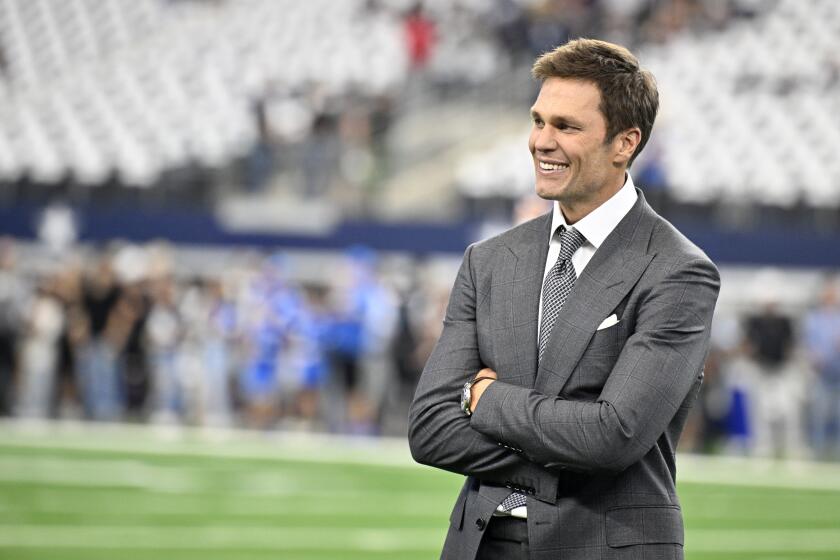Taiki Yamaoka Has Fastball, Will Travel : Baseball: At 18, pitcher left his family and friends in Japan to come to the United States and become a major leaguer.
Long before Nomomania gripped Southern California and Japan, teen-ager Taiki Yamaoka was in Osaka, dreaming of pitching in the American major leagues.
Which is why the 18-year-old had no reservations about leaving his home, his family and his friends in Japan and coming to a country where he understood only sign language: One finger means fastball, two for a curve.
When Yamaoka pitches for Valley South--an American Legion team with a distinctly international flavor--he isn’t followed by a corps of reporters charting his every move, as is Dodger phenom Hideo Nomo. Yamaoka is followed by baseball scouts, curious about the new kid with an interpreter--and an 85-m.p.h. fastball.
Yamaoka arrived in Los Angeles in March, having left his native country to follow a dream and escape Japanese baseball traditions he couldn’t accept.
“In Japan, they forced me to do things, in practices and with pitching,” Yamaoka said through an interpreter. “But here, I am deciding to do what I want.”
Yamaoka, all 5 feet 8 inches of him, has relied on his hard fastball and sharp curveball to mow down hitters this summer--he has a 1.49 earned-run average and 47 strikeouts in 47 innings.
He also throws a forkball, although it is still a little too raw for him to use in a game. Yamaoka’s fourth pitch is a changeup he learned from Dave Wallace, the Dodger pitching coach, who agreed to work with Yamaoka one morning this summer.
Unrefined as he is, Yamaoka still has admirers.
“I like the kid, I really do,” said Ken Widner, an associate scout for the Atlanta Braves. “He has a future in pro baseball.”
He had better, because that’s the only reason Yamaoka is on this side of the Pacific.
*
Yamaoka decided to leave Japan when his high school coaches tried to convert him into a sidearm pitcher. Yamaoka refused to change his style.
“My goal was always to be a pro,” Yamaoka said. “I knew that if I was throwing sidearm, I might be successful at the high school level, but for the next level up, I knew it wasn’t going to work for me.”
After two years of fighting Japanese tradition by resisting his coaches, Yamaoka decided his baseball career would be found in the United States.
Yamaoka’s parents agreed, so they flew across the Pacific last summer. They spent 10 days traversing the country, from Florida to San Francisco, looking for a program that would accept their son. No college would because he didn’t speak English.
Exasperated, the family was in a Los Angeles restaurant on the day before returning to Japan. The family’s discussion caught the ear of a patron who directed them to Hiro Misawa, a Japanese immigrant who lives in Tarzana.
Misawa, a friend of Reggie Smith, the Dodgers’ hitting coach, persuaded Smith to take a look at Yamaoka.
Although Yamaoka had to return to Japan before Smith could evaluate him last summer, he returned to Los Angeles in January and Smith spent about an hour putting him through his paces.
Smith, who had not even seen him pitch off a mound that day, gave Yamaoka a glowing scouting report. Yamaoka then returned to Japan to finish high school before rejoining Misawa and enrolling in an intensive English course at Cal State Northridge.
Yamaoka’s parents rented him a small one-bedroom apartment in Tarzana. In essence, though, he has become Misawa’s new oldest son.
Misawa had Yamaoka join an adult baseball team in Torrance and then the Legion team, but he’s proved to be too good for both.
“Every game he’s gotten much better than the game before,” said Rick Weber, Valley South’s coach. “I definitely think he should be pitching at a higher level.”
*
Yamaoka has been to the Grand Canyon and Magic Mountain and the beach since he’s been in the United States. In short, he is living a much more carefree life than the one he left behind in Japan.
“I like here better,” he said. “Japan goes so quick every day. Here it is more relaxed. You have time every day to enjoy things.”
He begins his weekdays with five hours of English classes. After that he is likely to be pitching to Misawa’s 15-year-old son, Hide, refining the changeup Wallace showed him.
Hide is Yamaoka’s constant companion and on-field translator, although the latter role is becoming less necessary as Yamaoka learns more English. Yamaoka is also learning bits of Spanish from his Valley South teammates, who joke with him constantly. They call him “Nomo” after particularly impressive performances.
“On the bench you can enjoy all the smiling, talking, joking,” Yamaoka said. “In Japan you have to be very quiet.”
Yamaoka’s Americanization will continue when he enrolls at L.A. Valley College in August. There he will continue to answer the questions that linger in scouts’ minds.
Will his 165-pound frame fill out? Will his changeup and forkball develop? Will he speak enough English to survive in some small minor league town?
The Dodgers’ Smith, who took Yamaoka to meet Nomo this summer, said Yamaoka could follow Nomo to pro baseball.
“He’s been clocked throwing the ball between 88 and 90 [m.p.h.] and he’s got a good split-finger,” Smith said. “If he has command, he has a chance.”
Smith added that the Seattle Mariners’ 1993 signing of Mac Suzuki, a hard-throwing 20-year-old right-hander from Japan, blazed a trail for Yamaoka.
And thanks to Nomo, the trail has become a four-lane highway.
“At least he knows now that path is real,” Smith said. “It has an end to it and it does lead to the major leagues.”
More to Read
Go beyond the scoreboard
Get the latest on L.A.'s teams in the daily Sports Report newsletter.
You may occasionally receive promotional content from the Los Angeles Times.










